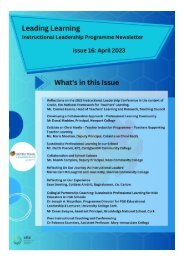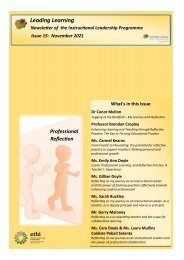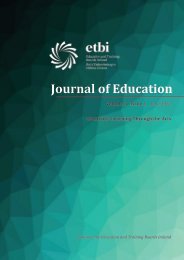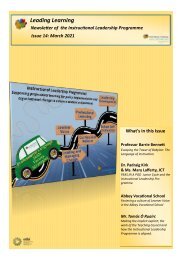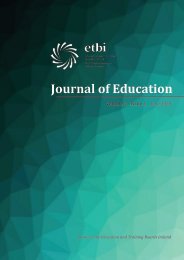ETBI Journal of Education - Vol 2:2 November 2020 (Irish-medium Education)
This bilingual edition of the Journal of Education celebrates Irish-medium Education
This bilingual edition of the Journal of Education celebrates Irish-medium Education
You also want an ePaper? Increase the reach of your titles
YUMPU automatically turns print PDFs into web optimized ePapers that Google loves.
<strong>ETBI</strong> <strong>Journal</strong> <strong>of</strong> <strong>Education</strong> <strong>November</strong> <strong>2020</strong><br />
Linguistic advantages and challenges faced by students from<br />
Gaeltacht and <strong>Irish</strong>-<strong>medium</strong> post-primary schools when continuing<br />
to a 3rd level institution where the language <strong>of</strong> teaching is English<br />
Dr Laoise Ní Thuairisg & Pr<strong>of</strong>. Pádraig Ó Duibhir - Dublin City University<br />
INTRODUCTION<br />
We are grateful to the Comhairle um Oideachas<br />
Gaeltachta agus Gaelscoileanna (COGG) for<br />
providing funding to carry out this project and to<br />
the students and past students who participated.<br />
Only around 50% <strong>of</strong> students from <strong>Irish</strong>-<strong>medium</strong><br />
primary schools (outside <strong>of</strong> the Gaeltacht)<br />
transfer to <strong>Irish</strong>-<strong>medium</strong> post-primary schools<br />
in the Republic <strong>of</strong> Ireland. One <strong>of</strong> the reasons for<br />
this is the anxiety experienced by parents that<br />
their children will be at a disadvantage at third<br />
level because they will not understand Englishlanguage<br />
terminology in various subjects (Ní<br />
Thuairisg & Ó Duibhir, 2016). This research<br />
aims to shed light on the experiences <strong>of</strong> past<br />
pupils from <strong>Irish</strong>-<strong>medium</strong> post-primary schools<br />
within and outside the Gaeltacht, particularly<br />
with regards to the effects <strong>of</strong> their post-primary<br />
education on their experience <strong>of</strong> third level<br />
education. An investigation was also carried<br />
out on the expectations <strong>of</strong> current pupils in<br />
<strong>Irish</strong>-<strong>medium</strong> post-primary schools, in order to<br />
compare their expectations with the reported<br />
experiences <strong>of</strong> past pupils who had already made<br />
the transition.<br />
The main findings <strong>of</strong> the research are presented<br />
in this article. The full report is available at www.<br />
cogg.ie. The article begins with a short literature<br />
PARTICIPANTS REPORTED<br />
THAT THERE WERE MORE<br />
BENEFITS THAN DISADVANTAGES<br />
ASSOCIATED WITH IRISH-MEDIUM<br />
EDUCATION<br />
review <strong>of</strong> bilingualism and <strong>of</strong> the benefits and<br />
challenges associated with bilingualism and<br />
the bilingual education system. The research<br />
methodology is then described. The findings <strong>of</strong><br />
the research will then be presented along with<br />
the recommendations arising from those findings.<br />
LITERATURE<br />
Various research from the last forty years<br />
indicates that there are cognitive benefits<br />
associated with bilingualism. These benefits<br />
are linked with a higher executive function in<br />
bilinguals than in monolinguals (Bialystok,<br />
2009) and continue into adulthood and old age<br />
(Bialystok et al., 2006). It has been discovered<br />
that bilingualism can slow the onset <strong>of</strong> dementia<br />
in old age (Bialystok, 2009). It is hypothesised<br />
that the process <strong>of</strong> dementia is delayed in<br />
bilingual people because they develop a higher<br />
level <strong>of</strong> executive function during their lives,<br />
which creates a cognitive reserve and slows the<br />
PAGE 93




